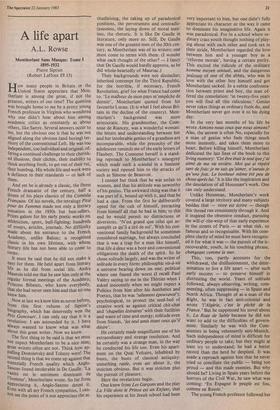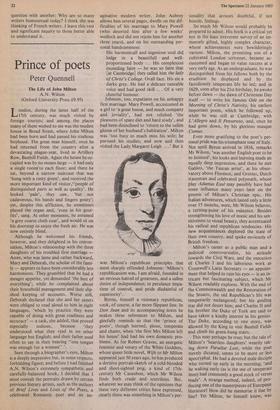A life apart
A.L. Rowse
Montherlant Sans Masque: Tome I 1895-1932 Pierre Sipriot (Robert Laffont £9.15) How many people in Britain or the United States appreciate that Mon- therlant is among the great, if not the greatest, writers of our time? The question was brought home to me by a pretty young French professor in Virginia who wondered why one didn't hear about him among academic critics as constantly as about others, like Sartre. Several answers occur to me, but the obvious one is that he was not aligned along the obvious (and boring) ter- ritory of the conventional Left. He was too independent, too individual and original,of- fering a continual challenge to their cherish- ed illusions, their cliches, their inability to think anything fresh, to get out of their rut, their humbug. His whole life and work were a defiance to their standards — or lack of them.
And yet he is already a classic, the finest French dramatist of the century, half a dozen of his plays classics of the Comedic. Francaise. Of his novels, the tetralogy Pitie pour les Femmes made not only a literary sensation in the 1930s but best-sellers. Prizes galore for his early poetic works on athleticism, sport, bull-fighting; hundreds of essays, articles, journals. No difficulty made about his entrance to the French Academy, unlike Balzac; a recognised classic in his own lifetime, with whom literary life has not been able to come to terms.
It must be said that he did not make it easy for them. He held apart from literary life as he did from social life. Andre Maurois told me that he saw him only at the regular formal meetings of the Academy; Princess Bibesco, who knew everybody, that she had never seen him and that no one knew him.
Now at last we know him as never before, from this first volume of Sipriot's biography, which has deservedly won the i
Prix Goncourt. I can only say that it is a revelation: 1 am astounded by it. I have always wanted to know what was what about this great writer. Now we know.
The first thing to be said is that we must not expect Montherlant to be a nice man; great writers often are not. Think how ap- palling Dostoievsky and Tolstoy were! The second thing is that we come up against that essentially French quality which Anglo- Saxons found intolerable in De Gaulle. 'La vanite est le sentiment dominant de ,
homme', Montherlant wrote. So far from appreciating it, . Anglo-Saxons detest it. Even with all my French sympathies, I can- not see the point of it nor appreciate the at-
titudinising, the taking up of paradoxical positions, the perverseness and contradic- tiousness, the laying down of moral max- ims, the rhetoric. It is like De Gaulle in literature, only more so. Still, De Gaulle was one of the greatest men of the 20th cen- tury, as Montherlant was of its writers: one must come to terms with them. (I wonder what each thought of the other? — I fancy that De Gaulle would hardly approve, as he did whole-heartedly of Mauriac.)
Their backgrounds were not dissimilar; inherited contempt for the Third Republic, for the horrible, if necessary, French Revolution, grief for what France had come to. 'Le malheur de mon pays m'empeche de dormir', Montherlant quoted from his favourite Lucan. (It is what I feel about Bri- tain in the decline of the country). Mon- therlant's background was more aristocratic. His grandmother, the Com- tesse de Riancey, was a wonderful woman: the letters and understanding between her and her intolerable genius of a grandson are incomparable, while the precocity of the adolescent reminds me of the early letters of Flaubert. The Comtesse herself is a stand- ing reproach to Montherlant's misogyny which made such a scandal in a feminist society and opened him to the attacks of such as Simone de Beauvoir.
I cannot but think that he was unfair to women, and that his attitude was unworthy of his genius. The awkward thing was that it was part of it, bound up with it, and that he had a case. From the first he deliberately opted for the cult of himself, extracting from himself all that he had in him; to this end he would permit no distractions or diversions. 'N'est grand que celui qui ac- complit ce qu'il a tire de soi'. With his con- ventional family background he sometimes considered marriage, but always concluded that it was a trap for a man like himself, that life a deux was a bore and conventional obligations the death of the spirit. So he chose solitude largely, and was the writer of solitude in every form: philosophic vis-à-vis a universe bearing down on one; political where one feared the worst (I recall Paul Valery saying to me in the Thirties when I asked innocently when we might expect a Politics from him after his Aesthetics and Poetics, that he was `tellement epouvante'); psychological, to protect the seed-bed of creative work as against critical chit-chat and `chapelles literaires' with their futilities and waste of time and energy; solitude even from friends, `les seul arnis etant ceux qu'il desire'.
He certainly made magnificent use of his extraordinary and strange resolution. And he certainly was a strange man, in the way he conducted his life too. Even his apart- ment on the Quai Voltaire, inhabited by busts, the busts of classical antiquity: something raide, even sec about it, the stoicism obvious. But it was stoicism plus the pursuit of pleasure.
Here the revelations begin.
One knew from Les Garcons and the play La Ville dont le Prince est un Enfant, that his experience at his Jesuit school had been very important to him, but one didn't fully appreciate its character or the way it came to dominate his imaginative life. Again it was paradoxical. For in a school where or- dinary crass youth thought nothing of play- ing about with each other and took sex in their stride, Montherlant regarded the love between him and a younger boy as a `reforme morale', having a certain purity. This excited the ridicule of the ordinary homme moyen sensuel, and the dangerous jealousy of one of the abbes, who was in love with the other boy himself and got Montherlant sacked. In a subtle confronta- tion between priest and boy, the man of- fered the consolation: 'in twenty-five years you will find all this ridiculous.' Genius never takes things as ordinary fools do, and Montherlant never got over it to his dying day.
In the very last months of his life he wrote Aimons-nous ceux que nous aimons? Alas, the answer is often No, especially for a man of genius who feels things much more intensely, and takes them more to heart. Before killing himself, Montherlant dedicated the last lines of the book to this living memory: `Cet etre &all le seul que j'ai aime de ma vie entiere. Moi qui ai repete tant de fois: je ne sais qu'aimer, n'aurais-je qu'une fois. Le bonheur meme ete peu de chose apres lui.' It is like the inspiration and the desolation of all Housman's work. One can only understand.
Unlike Housman, Montherlant's work covered a large territory and many subjects besides that — vivre est ecrire — though this thread ran consistently through it. And it inspired the obsessive conduct, pursuing the will-o'-the-wisp of that early experience in the streets of Paris — at what risk, so famous and so recognisable. With his com- plete clarity of mind he must have recognis- ed it for what it was — the pursuit of the ir- recoverable, youth, in his touching phrase, changeant comme la mer.
This, too, partly accounts for the withdrawal, the disillusionment, the deter- mination to live a life apart — after such early success — to preserve himself in distrusting the world. Years of solitude followed, always observing, writing, com- menting, often suppressing — in Spain and North Africa. Thought of as a man of the Right, he was in fact anti-colonial and wrote TAlgerie, c'est le peche de la France.' But he suppressed his novel about it, La Rose de Sable because he did not want to add to the difficulties of govern- ment. Similarly he was with the Com- munists in being vehemently anti-Munich. Such independence of mind is difficult for ordinary people to take, but they might at least try to understand; he had a better record than the herd he despised. It was made a reproach against him that he never tried to conciliate the public — being too proud — and this made enemies. But why should he? Living in Spain years before the horrors of the Civil War, he saw what was coming: 'En Espagne le peuple est fou, comme en Russie.'
The young French professor followed her question with another: Why are so many writers homosexual today? I think she was thinking of French writers. I leave this vast and significant inquiry to those better able to understand it.







































 Previous page
Previous page